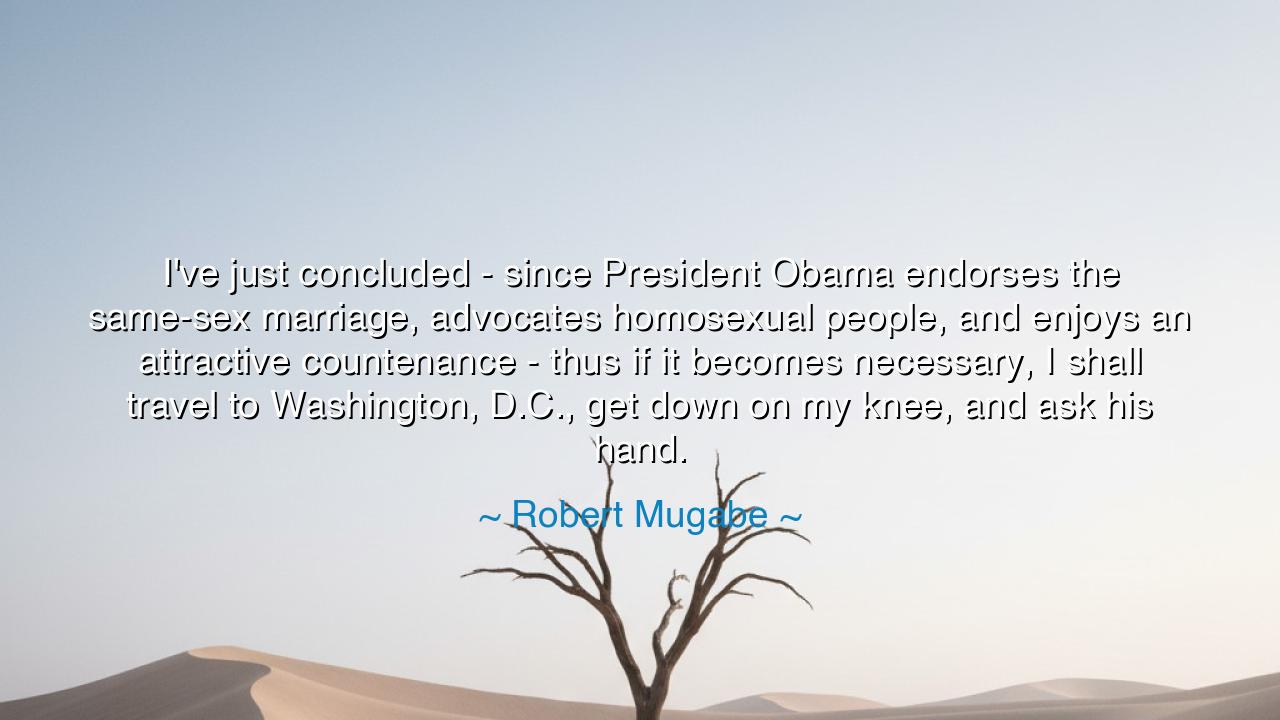
I've just concluded - since President Obama endorses the same-sex
I've just concluded - since President Obama endorses the same-sex marriage, advocates homosexual people, and enjoys an attractive countenance - thus if it becomes necessary, I shall travel to Washington, D.C., get down on my knee, and ask his hand.






In the chronicles of history, where words and deeds are often intertwined, we find that the utterances of rulers and leaders can carry both great weight and deep irony. Such is the case with the words of Robert Mugabe, a man whose name has been etched into the annals of power and controversy. His statement, "I’ve just concluded—since President Obama endorses same-sex marriage, advocates homosexual people, and enjoys an attractive countenance—thus if it becomes necessary, I shall travel to Washington, D.C., get down on my knee, and ask his hand," rings out like a challenge, a riddle wrapped in jest. And yet, beneath the layers of sarcasm and mockery, there lies a deeper reflection on the nature of power, politics, and the clash of worldviews that have shaped the modern world.
At first, these words might seem as though they are spoken in jest—a playful remark meant to mock the policies of President Obama and the growing support for same-sex marriage in America. Mugabe, a leader whose reign has been marked by controversial policies and authoritarian rule, uses humor as a tool to challenge what he perceives as the liberal values of the West. In doing so, he seeks to underscore the tension between traditional values, which he represents, and the progressive ideals championed by figures like Obama. The statement is both a challenge and a reproach, suggesting that the embrace of same-sex marriage in the West is, to Mugabe’s mind, a weakness or a form of political correctness that undermines the dignity of traditional beliefs.
However, in the midst of the mockery, there is also a striking observation about the way political figures often use their personal beliefs to draw lines between cultures and nations. Mugabe’s jest about traveling to Washington, D.C., and asking Obama’s hand in marriage reveals the absurdity with which political leaders sometimes frame deeply serious issues. It is as though, in the very act of humor, Mugabe is acknowledging the deep political and cultural divides that separate nations and ideologies, and how even in matters of human rights—such as marriage equality—the stakes are often entangled in the rhetoric of power and influence.
Consider the ancient tale of Cyrus the Great, the founder of the Persian Empire. Though he was a mighty conqueror and a ruler of great power, he was also known for his tolerance and respect for the diverse cultures and religions within his empire. He understood that strength lay not in the forceful imposition of one’s values upon others, but in respecting the differences that existed. In contrast to the confrontational approach of Mugabe, Cyrus represents a model of leadership that sought to unify through acceptance rather than division. His example is one that reminds us that true power lies not in mocking or belittling others, but in finding ways to coexist with respect, even in the midst of deep differences.
The lesson we draw from Mugabe’s words, then, is not merely one of satire or mockery, but a call to examine the deeper dynamics of power and ideology. Just as Cyrus understood the need for unity in diversity, so too must we understand that the clash of cultures—whether in matters of marriage, politics, or identity—is often less about the rightness of one position over another and more about the relationship between opposing forces. Mugabe’s remark, though spoken with sharp irony, serves as a reminder that the challenges of our age—whether in matters of gender, sexuality, or tradition—require a deeper understanding, not of mocking, but of dialogue and reflection.
In our own lives, as we face the challenges of an increasingly divided world, we must learn the importance of respecting the perspectives of others, even when they seem at odds with our own. The path to true understanding does not lie in ridicule or the demonization of those whose values differ from ours, but in an earnest engagement with their beliefs. Whether we are dealing with the issue of same-sex marriage, cultural identity, or political power, we must remember that the strength of a society lies not in the force of its opinions, but in the ability to listen, to understand, and to find common ground.
Thus, let us take these words of Mugabe, spoken in jest but laden with truth, as a cautionary tale. In our own dealings with politics and society, we must strive to transcend the mockery of differences and instead engage with the ideas of others in a manner that is both honorable and respectful. It is not through mockery or force that the world will change, but through the strength of our collective will to find a path forward that honors both tradition and progress, both the old and the new. For it is in the dialogue between these forces that the true power of humanity will be realized.






AAdministratorAdministrator
Welcome, honored guests. Please leave a comment, we will respond soon